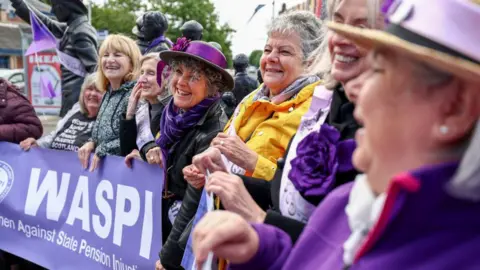Government to rethink rejection of Waspi compensation
18 minutes agoKevin PeacheyCost of living correspondent

 Getty Images
Getty ImagesA decision to reject compensation for women hit by changes to the state pension age will be reconsidered by the government.
Campaigners say 3.6 million women born in the 1950s were not properly informed of the rise in state pension age to bring them into line with men.
Last year, the government apologised for a 28-month delay in sending letters, but rejected any kind of financial payouts.
A document was not shown to Liz Kendall, who was Work and Pensions Secretary at the time of the decision, but had since come to light and needed to be considered, the government has now said.
Current Pensions Secretary Pat McFadden told the Commons that retaking the decision did not mean that payouts would be made to those affected.
“Retaking this decision should not be taken as an indication that government will necessarily decide that it should award financial redress,” he said.
The undisclosed evidence involved was a survey from 2007, and McFadden said that checks would be made to ensure other documents and surveys had not been missed. No timescale has been given for the work to be done.
“I understand that people are impatient for this matter to be resolved,” he said.
“It is important that we give it full and appropriate consideration.”
Compensation recommended
At the start of last year, a parliamentary ombudsman recommended compensation of between £1,000 and £2,950 for each of those affected.
While the Parliamentary and Health Service Ombudsman (PHSO) could recommend compensation, it could not enforce it and the government rejected it.
Ministers said there was no evidence of “direct financial loss” resulting from the government’s decision, and that Labour did not believe that paying a flat rate to all women at a cost of up to £10.5bn would be “fair or proportionate” to taxpayers.
The Women Against State Pension Inequality (Waspi) campaign had called for payments of at least £10,000 each.
It is pursuing a judicial review of the government’s decision not to pay compensation. Campaigners raised money for the legal challenge and a court capped the contribution to the government’s legal fees if they were unsuccessful.
The case was scheduled to go to the High Court in December. The government has now informed the court of its latest decision.
The age at which people receive the state pension has been increasing as people live longer, and currently stands at 66 for men and women.
But for decades, men had received their state pension at 65 and women at the age of 60.
Under the 1995 Pensions Act a timetable was drawn up to equalise the age at which men and women could draw their state pension. The plan was to raise the qualifying age for women to 65 and to phase in that change from 2010 to 2020.
But the coalition government of 2010 decided to speed that up. Under the 2011 Pensions Act the new qualifying age of 65 for women was brought forward to 2018.
The increases have been controversial. Campaigners say women born in the 1950s have been treated unfairly by the rapid changes and the way they were communicated to those affected.